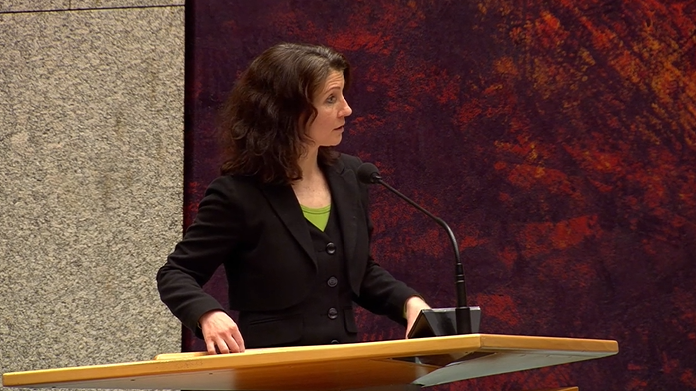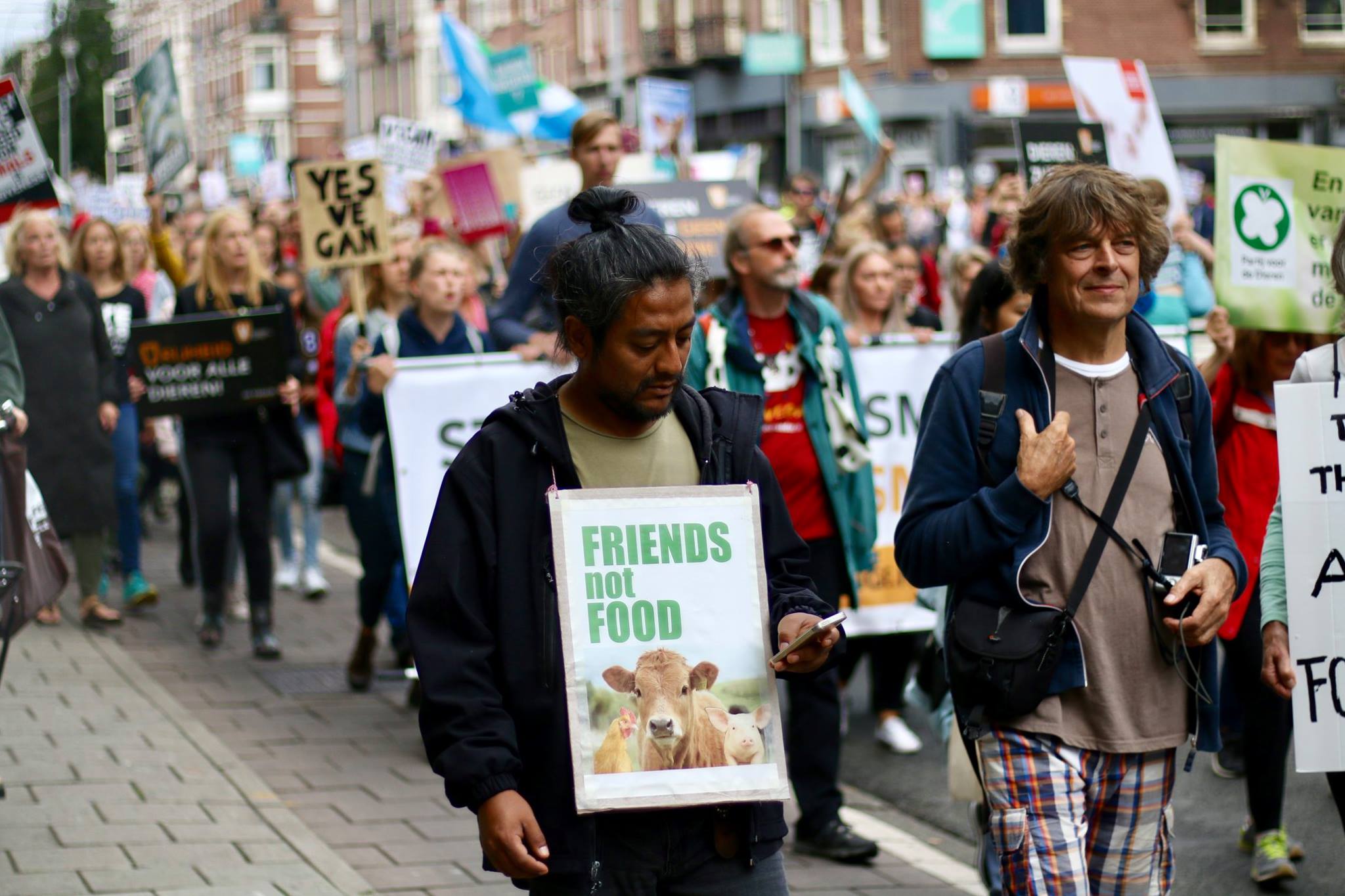Worldlog Esther Ouwehand
In my latest Worldlog of 2018, I announced that in the new year, the Dutch Lower House was going to have a fundamental debate on the suffering and dying of livestock animals. This debate took place two weeks ago, and last week the Lower House voted on the different motions the Party for the Animals had tabled in order to help the animals. We had asked our colleagues of other political parties in advance to show courage, to think about their responsibility for the fate of the over 64 million animals bred, used and killed in the Dutch livestock sector each year.
The debate was a historic one, as awareness in society is growing stronger every day. However, during the debate and subsequent votes, the politicians decided to stand on the wrong side of history once again. Confronted with the large-scale suffering of livestock animals on a daily basis, the majority of our fellow politicians did what they always do: deny and trivialise the facts, and demonise the messenger. Activists who had shown citizens what really goes on behind closed doors with animals, were dismissed as criminals; while it is these very activists who are trying to protect a key value of our democracy: the right to honest information. This right is under pressure as consumers are deceived by their government, supermarkets and the livestock sector: happy animals on brochures and packaging; exploited animals in the stables.

Esther Ouwehand during the debate on animal suffering in livestock sector
It is not the farmers, but the system that is under debate. A system in which people need to be constantly woken up by images of reality, and in which the supervisor fails in upholding the already weak rules. Undercover footage frequently shows pigs, social animals, trapped between bars, forced to watch their piglets being mutilated. Their tails are docked and their teeth clipped without the use of anaesthesia. Although our Minister of Agriculture denies that the practices shown in the images are representative of the sector, they are allowed by the Minister’s own law. The current rules allow for these horror practices.
Over 18 years ago, a majority of the political parties in the Netherlands made a promise that by 2022, the animal’s perspective would be a determining factor in the livestock sector: animals would be allowed to express their species-specific, natural behaviour. So, the good news is that basically, everyone in the Lower House is in agreement: today’s intensive livestock farming, the way the animals in this sector are bred, used and killed, is morally unacceptable. The animal’s intrinsic value is recognised by the Lower House as well as by the law.
However, when actual measures are needed to comply with this view, politicians refuse to take action. What they are actually saying, is “Yes, we recognise the animal’s intrinsic value, but not when it comes to a ‘production animal’. Not when we can use it to make money.” This means that the things you – quite rightly –cannot do to a dog and which will lead to a significant fine or punishment, are allowed by our politicians when it comes to cows, pigs, chickens and goats. Thereby, our Minister of Agriculture and the majority of our fellow politicians have created their own fundamental balancing act.
Animals are conscious, living creatures with feelings. People faced with the day-to-day reality of livestock farming immediately see that the system is utterly despicable. Almost 20 years ago, the animals were promised an end to this system. Now it is up to the Lower House to show they will keep that promise.
Moreover, addressing the issue of the livestock sector is the great taboo in politics, despite it being the most rational and effective solution to animal suffering, environmental damage and climate change. We need to rigorously reduce livestock numbers. It is inevitable. It is not just the Party for the Animals who believes that; it is scientists, and even the Dutch government’s most important advisory bodies. Standing up for animals is the ultimate solution to all the problems we are facing in the world. Not only will we prevent animal suffering, but it will help us solve the problems of climate change and biodiversity loss and defeat hunger in the world. A transition to a plant-based diet will generate a healthy, sustainable and animal-welfare friendly future.

March for Animal Rights in Amsterdam 2018
It is unwise and unfair to have farmers invest even more in a system that we already know to be unsustainable. Instead, we need to prepare our farmers for a plant-based future. That is why the Party for the Animals is proposing to stop the millions in subsidies currently going to Dutch livestock farming and use it instead to scale down the livestock sector. Stop the breeding of animals for slaughters and start the transition to plant-based.
The lobbying body of the intensive livestock sector is extremely powerful. But luckily, more and more people and even companies are making the transition to plant-based. The time is now. After hundreds (!) of years of only a small minority standing up for animals, people are now rapidly gaining more awareness. The animal rights movement is the fastest growing social movement of our time. Join us!
Next Thursday, #Powerplant, our scientific bureau’s newest documentary, will be released in Amsterdam. In the documentary, the opportunities for a plant-based society are examined, as well as how this can save our planet. The documentary will probably be shown around the world, so keep an eye on our social media pages for any updates!
This will be my last Worldlog for now. Our party leader Marianne Thieme has come back from sick leave and will share her experiences with you in the following Worldlogs.
To conclude: click here for a wonderful piece of stand-up comedy by American Peacher Lawson.
Kind regards,
Esther Ouwehand
No meu último Worldlog de 2018 eu anunciei que no novo ano teríamos um debate fundamental na Câmara Baixa sobre o sofrimento e a morte dos animais na indústria pecuária. O debate teve lugar duas semanas passadas e na semana passada houve a votação sobre as diferentes moções que tínhamos apresentado para ajudar os animais. De antemão pedimos aos nossos colegas de outros partidos políticos para mostrarem coragem. Para pensar profundamente sobre a responsabilidade que eles carregam pelo destino de mais que 64 milhões de animais que cada ano são criados, usados e matados pela indústria pecuária holandesa.
O debate foi histórico porque na sociedade iniciou-se uma conscientização que fica cada dia mais forte e clara. Mas durante o debate e a votação depois, a política se posicionou de novo no lado errado da história. Quando confrontados com o sofrimento maciço e diário dos animais na indústria pecuária a maioria dos colegas políticos fizeram o mesmo que sempre fazem: ignorar, banalizar e demonizar o mensageiro. Ativistas que mostram ao público o que acontece com os animais atrás das portas fechadas foram colocados como criminosos. E isto enquanto que estes ativistas querem proteger um dos valores centrais de nossa democracia: o direito a informações verídicas. Este direito está em perigo pois os consumidores estão sendo enganados pelo governo, os supermercados e o setor agrícola: animais felizes nas brochuras e embalagens, animais abusados no estábulo.

Esther Ouwehand durante o debate sobre o sofrimento dos animais na pecuária
Não os fazendeiros, mas o sistema está em discussão. O sistema onde continuamente as pessoas precisam ser acordadas com imagens da realidade e onde o supervisor falha na manutenção de regras em si já fracas. Em imagens obtidas disfarçadamente vemos regularmente animais sociais como porcos presos entre barras, vendo como seus filhotes são mutilados. Sem anestesia os rabinhos dos leitões são cortados fora e seus dentinhos são limados. A ministra nega que tais imagens são representativas mas o que vemos é permitido pela lei da própria ministra. As regras atuais permitem estas práticas horrorosas.
Há mais que 18 anos a maioria dos partidos políticos prometeram que o mais tardar em 2022 a perspectiva do animal seria o ponto de partida na pecuária: os animais poderiam exercer seu comportamento natural. Portanto, a boa notícia é que propriamente dito nós concordamos na Câmara Baixa: a indústria pecuária intensiva como funciona agora, a maneira pela qual os animais são criados, usados e matados, é moralmente inaceitável. Tanto a Câmara quanto a lei reconhecem também o valor intrínseco do animal.
Mas quando medidas verdadeiras devem ser tomadas para validar aquelas conclusões a política nega entrar em ação. Na verdade, a política diz: “Sim, nós reconhecemos o valor intrínseco do animal mas não quando se trata de um ‘animal de produção’, isto é, quando podemos ganhar dinheiro com o animal.” Portanto, o que devidamente não se pode fazer com um cachorro e resultaria numa punição ou multa severa, é conforme a política permitido fazer com vacas, porcos, galinhas e cabras. Desta maneira nossa ministra de Agricultura e a maioria de nossos colegas na política criam para si uma incoerência fundamental.
Animais são seres vivos conscientes e sensitivos. Quando as pessoas podem dar uma olhada na realidade diária da pecuária, imediatamente elas vêem que é uma prática totalmente repreensível. Há quase 20 anos prometemos aos animais que iríamos findar este sistema. Agora cabe à Câmara Baixa atual mostrar que a promessa feita aos animais será cumprida.
Ademais: abordar a industria pecuária é o maior tabu na política a despeito de ser a solução mais racional e efetiva para o sofrimento animal, a danificação da natureza e a mudança do clima. Devemos diminuir rigorosamente o rebanho. Isto é inevitável. Não só o Partido pelos Animais acha isto mas também a ciência e até mesmo o órgão consultivo mais importante do governo holandês. Defender os animais é o canivete suíço para todos os problemas que devemos combater no mundo. Pois além de evitar sofrimento animal, de uma só vez ajudaríamos a parar a mudança do clima e a perda da bio-diversidade e ainda por cima acabaríamos com a fome no mundo. A transição para vegetais é o futuro saudável, sustentável e amigável aos animais.

Marcha pelos direitos animais em Amsterdam 2018
Não é sensato e também não é honesto deixar os fazendeiros investirem num sistema quando já se sabe que este sistema será insustentável. Devemos preparar nossos fazendeiros para um futuro vegetal. Por isto o Partido pelos Animais propõe usar os milhões dos subsídios destinados a pecuária para uma supressão gradual da indústria pecuária. Acabar com a criação de animais para o abate e começar a transição para vegetais.
O lobby da pecuária intensiva é muito forte. Mas felizmente sempre mais pessoas e até empresas passam para vegetais. A hora é agora. Após tantas centenas de anos em que uma pequena minoria defendia os animais, agora as pessoas rapidamente se tornam conscientes. O movimento pelos direitos animais cresce mais rapidamente que qualquer outro movimento social no nosso tempo. Junte-se!
Na quinta-feira que vem vai haver em Amsterdam a estreia de #Powerplant, o novo documentário de nosso departamento científico, no qual são investigadas as possibilidades de uma sociedade vegetal e como isto pode salvar nosso planeta. Provavelmente o documentário vai passar pelo mundo inteiro, portanto fique de olho nas páginas de nossas mídias sociais para atualizações!
Por enquanto este é meu último Worldlog. Nossa líder Marianne Thieme está de volta da sua licença médica e ela compartilhará suas experiências com vocês nos próximos Worldlogs.
Para terminar: clique aqui para um ótimo pedacinho de comédia stand-up do americano Preacher Lawson
Saudações
Esther Ouwehand